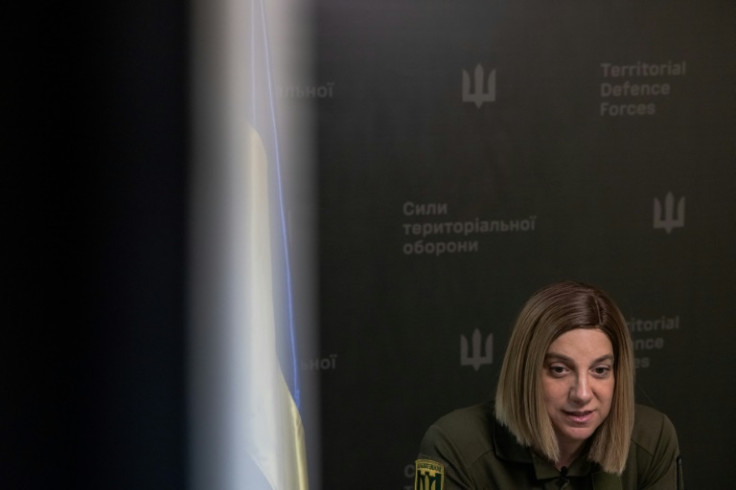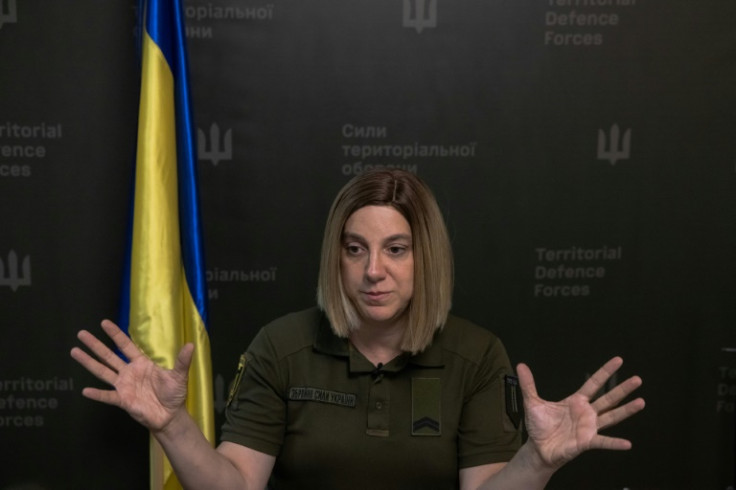'Embrace The Hate': Ukraine Military's Trans Spokesperson

When Sarah Ashton-Cirillo, a trans woman from Nevada, came to Ukraine in March 2022 she planned to report on refugees.
She ended up fighting for Ukraine and is now a spokesperson for the country's territorial defence force, explaining the war to English-speaking audiences.
On a visit to the studio she operates from, at a secret location in Kyiv, she smiled as she said her unit's mantra is to "embrace the hate of the Russians".
"If the Russians are angry at us, it means we are doing our job," said the blond-haired 46-year-old American, who was wearing a khaki polo shirt.
On that basis, she is getting results.
Last week, Russian television showed an hour-long special calling Ashton-Cirillo a "terrible disgrace to the Ukrainian people" and a "monster".
Ashton-Cirillo, who has a background in journalism and research, said she had only planned a two-week stay in Ukraine.
Nineteen months in, she is a junior sergeant and hosts live YouTube shows from her studio called "Ukraine in the Know" and "Russia Hates the Truth".
She also constantly posts on Twitter, where she has 156,000 followers.
Ashton-Cirillo, who does not speak Ukrainian, reports on Ukraine's official statements and mocks Russian media coverage.
Her role also includes monitoring international media.
In August, she announced a "boycott" of CNN after they called foreign fighters in Ukraine "mercenaries". The US broadcaster swiftly corrected the article.
On a tour of the studio, she introduced colleagues -- all with frontline experience -- before changing into a uniform with her unit's badge and the Latin motto "Ad resistendum" (To Resist).
She has editorial control of her own production and aims to avoid a dry, number-based approach to covering the war.
"I'm sure my command gets a little bit anxious over what might be coming. However, they appreciate my work," she said.
The YouTube channel's viewing figures were just over 20,000 for August, but the degree of outrage in Russian media over Ashton-Cirillo is far out of proportion to that.
"The Russians are obsessed," she said.
"I trend Google worldwide pretty regularly. And most of the traffic is out of Russia."
Ukrainian reactions have been mixed, she said, with some asking "how certain aspects of who I am would mesh with Ukrainian society".
The country has become more tolerant in recent years.
It has hosted gay pride events and allows LGBTQ soldiers to join the army, but the European Court of Human Rights has criticised its lack of legal recognition for same-sex couples.
When she first arrived, Ashton-Cirillo worked in the eastern Kharkiv region, combining journalism and civic activism.
Much of the region came under Russian occupation and it has suffered many missile strikes.
"Witnessing the war crimes up close, the Russian terrorism up close, was the process that led me from impartial observer.... to becoming a combatant," she said.
"I felt that I could do more as a soldier, and from within the system."
She volunteered to join a unit of Crimean Tatars, a Muslim ethnic minority, becoming a combat medic -- a role that includes fighting -- with the call sign Blonde.
She quickly appeared on Russia's radar.
Russian foreign ministry spokeswoman Maria Zakharova in April 2022 referred to a "transgender journalist from Las Vegas who broadcasts from Kharkiv and photographs themselves hugging bandits".
Ashton-Cirillo said she was initially upset, but her Ukrainian colleagues urged her to become even "more verbal".
Russia ramped up attacks on her early this year, she said.
"I was being accused of literally being Satan, that I was just answering to the (US) State Department. These crazy, crazy comments," she said.
"When the Russians found out that I was on the front, they were actively looking for my unit," she claimed.
"They were absolutely attempting to make sure that I was neutralised in some way, either by being captured or killed."
The armed forces decided she had to leave the front line and suggested she work for the media unit, she said.
She was initially reluctant and felt guilty about leaving her comrades behind.
"I didn't want to come to Kyiv -- 100 percent. I wanted to be with my unit in the east," she said.
"But right now our duty is to carry out this information war."

© Copyright AFP 2025. All rights reserved.





















